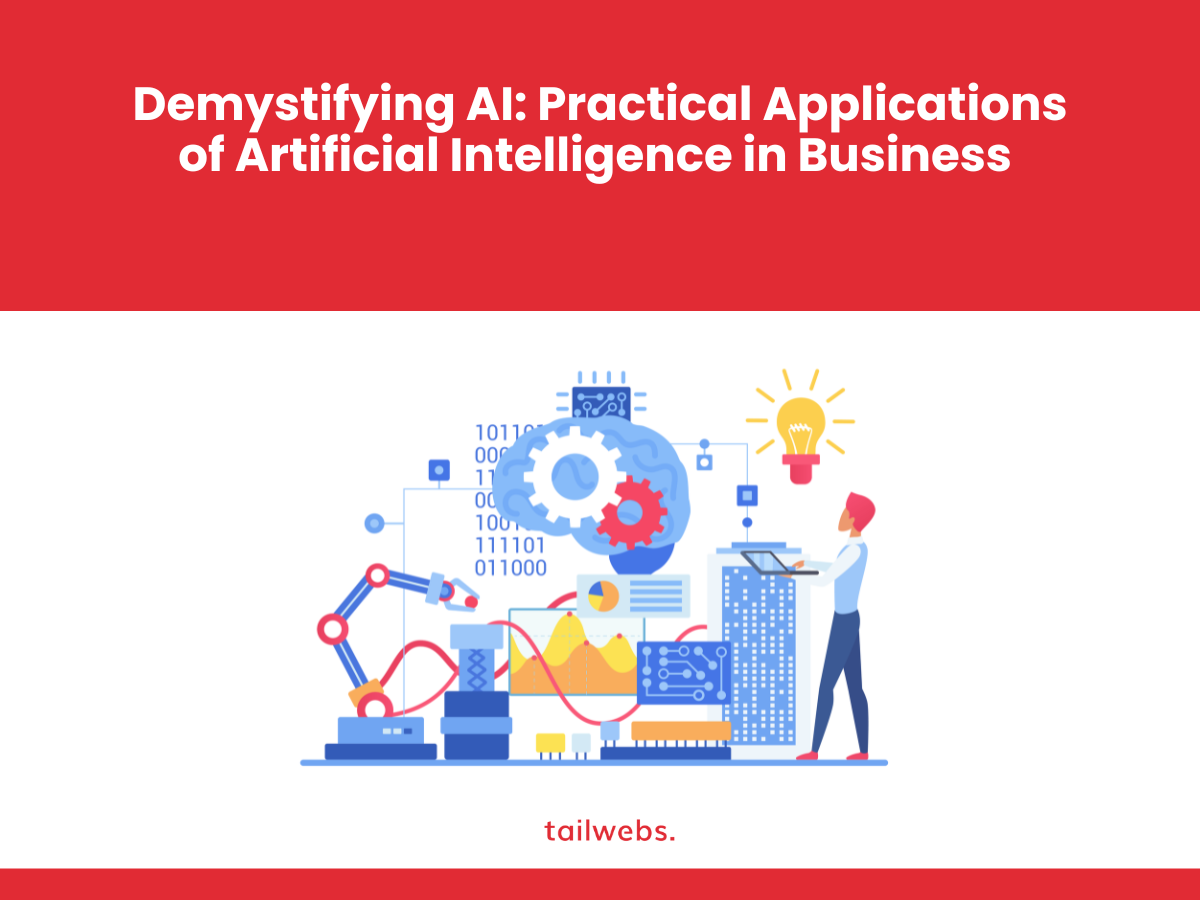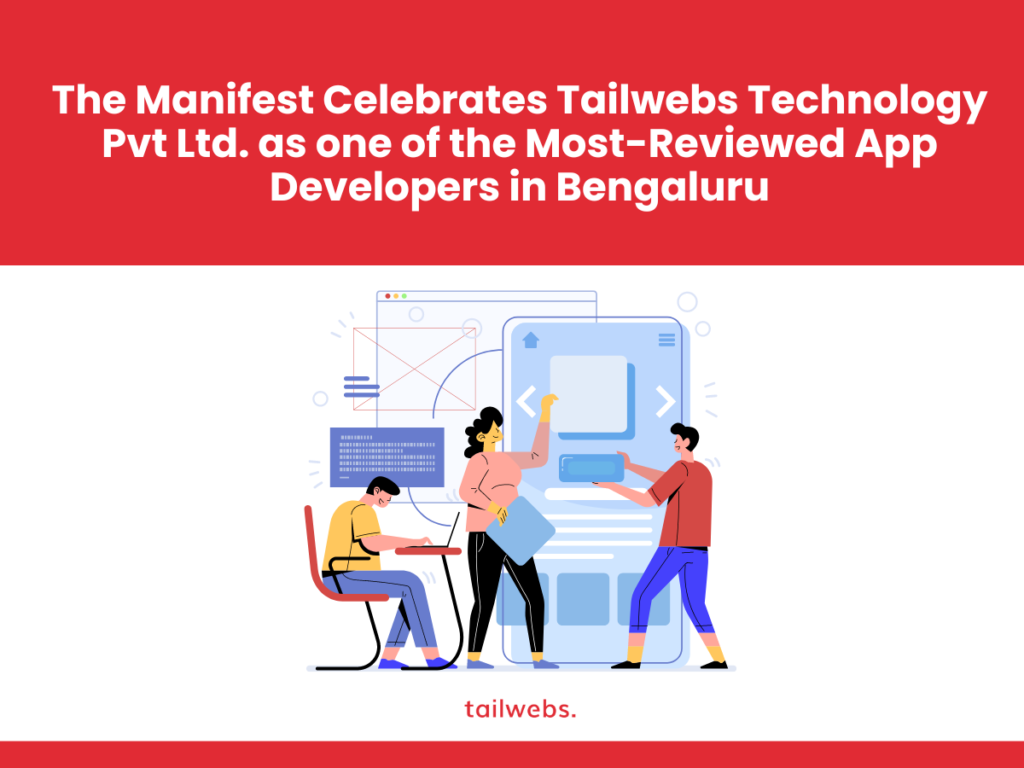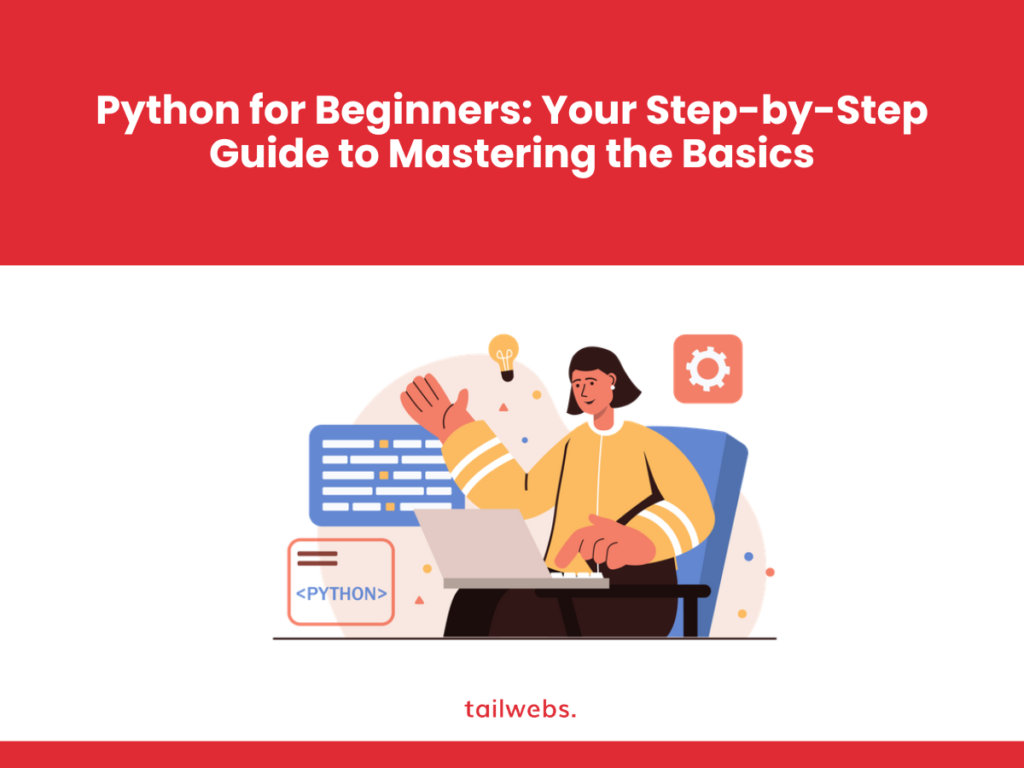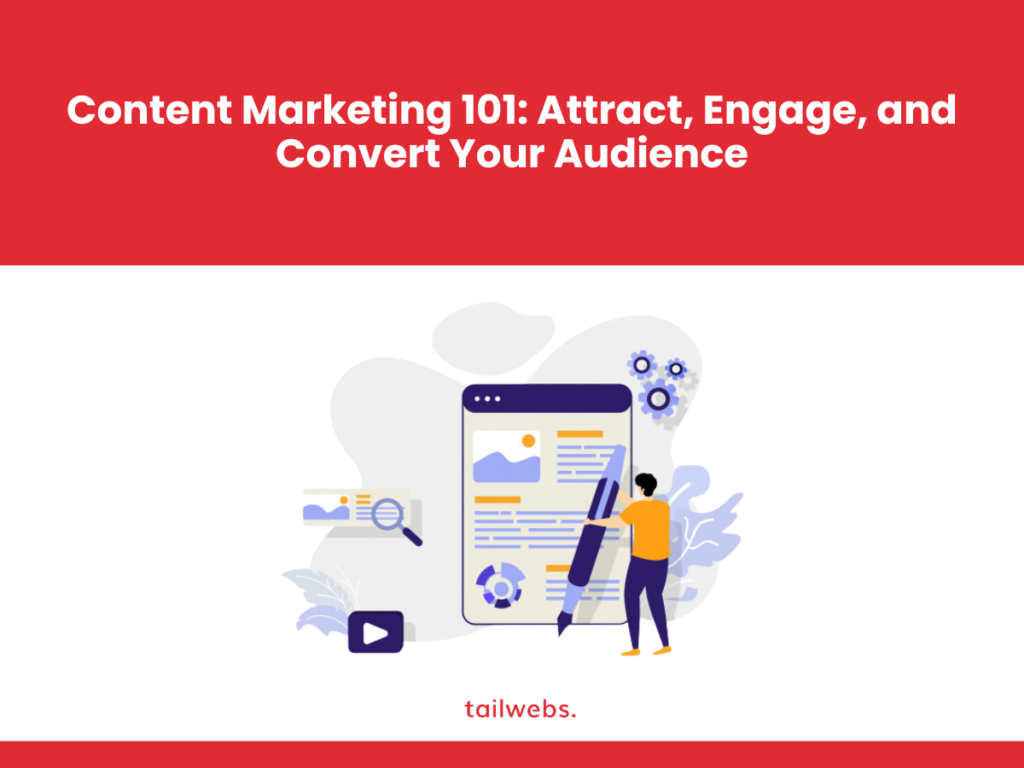Forget the sci-fi robots stealing our jobs or taking over the world. Artificial intelligence (AI) is no longer just a futuristic fantasy; it’s woven into the fabric of our daily lives, from personalised shopping recommendations to smartermail spam filters. And in the realm of business, AI is no longer an optional perk – it’s a game-changer, a powerful tool with the potential to revolutionise every aspect of your operations.
But for many businesses, AI can feel like a mysterious black box, a complex technology shrouded in technical jargon and intimidating algorithms. So, let’s shed some light on this technology and explore some practical applications of AI that can empower your business to thrive:
1. Supercharged Sales and Marketing:
Smarter Lead Generation and Targeting:
AI analyses vast datasets to identify your ideal customers, predict purchasing behaviour, and personalise marketing campaigns for maximum impact. Imagine identifying high-potential leads with pinpoint accuracy or crafting targeted advertisements that resonate deeply with your audience.
Enhanced Customer Relationship Management (CRM):
AI-powered chatbots answer customer queries 24/7, provide personalised recommendations, and even predict churn risk, fostering deeper customer relationships and boosting loyalty. Think of a virtual assistant seamlessly answering customer questions while recommending relevant products, all powered by AI.
2. Streamlined Operations and Efficiency:
Automated Tasks and Workflows:
AI automates repetitive tasks like data entry, scheduling, and report generation, freeing up your human workforce to focus on strategic initiatives. Imagine AI handling all your invoice processing, freeing up accounting staff for more complex analysis.
Predictive Maintenance and Quality Control:
AI analyses sensor data and machine readings to predict equipment failures and prevent downtime, ensuring smooth operations and minimising production costs. Picture AI algorithms detecting potential machinery issues before they disrupt your production line.
3. Data-Driven Decisions and Insights:
Business Intelligence and Analytics:
AI sifts through mountains of data, uncovering hidden patterns and trends that inform smarter business decisions. Imagine gaining real-time insights into customer behaviour, market trends, and competitor activity, all thanks to AI analysis.
Risk Management and Fraud Detection:
AI identifies anomalies and suspicious patterns in real-time, flagging potential fraud attempts and mitigating financial risks. Think of AI acting as a vigilant sentinel, protecting your business from financial vulnerabilities.
4. Personalised Customer Experiences with Artificial intelligence :
Product Recommendations and Dynamic Content:
AI learns individual customer preferences and recommends products or content tailored to their unique needs and interests. Imagine a website that suggests just the right item you were planning to buy, thanks to AI personalization.
Voice Assistants and Conversational Interfaces:
AI-powered chatbots and voice assistants provide personalised customer support, answer questions, and handle transactions, creating a seamless and convenient experience for your customers. Picture a helpful virtual assistant guiding your customers through product options and addressing their inquiries with precision.
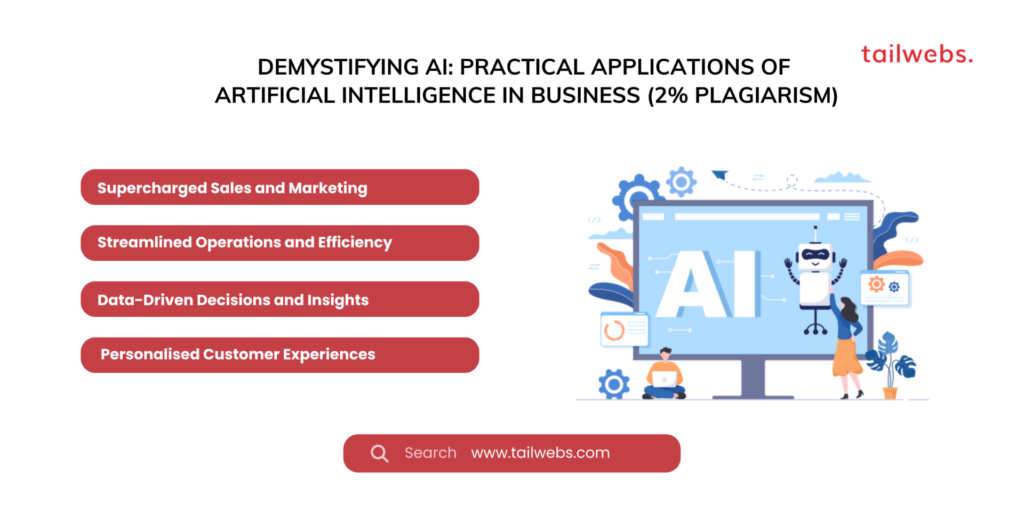
Remember:
AI is not a one-size-fits-all solution. Define your business goals and choose AI applications that align with your specific needs and resources.
Data is the fuel for AI. Invest in quality data collection and management to ensure your AI models are powered by accurate and relevant information.
Embrace human-AI collaboration. AI enhances human capabilities, not replaces them. Leverage AI as a tool to empower your workforce and unlock their full potential.
Stats to Supercharge Your SEO:
The global AI market is expected to reach $583.2 billion by 2026. (Statista, 2023)
84% of businesses believe AI will give them a competitive advantage. (Forbes, 2023)
AI-powered marketing campaigns can deliver 80% higher conversion rates. (Marketing AI Institute, 2023)
Predictive maintenance powered by AI can reduce maintenance costs by up to 30%. (McKinsey & Company, 2023)
Recommended Tools and Resources:
Google Cloud AI Platform: A suite of AI and machine learning tools for businesses.
Microsoft Azure AI: A collection of AI services for building and deploying intelligent applications.
IBM Watson: AI solutions for various industries, from healthcare to finance.
Books: “Artificial Intelligence for Dummies” by John Paul Mueller and Luca Massaron, “Superintelligence” by Nick Bostrom, “AI for Marketing” by Paul Roetzer
Podcasts: Lex Fridman Podcast, AI Today, Machine Learning Guide.
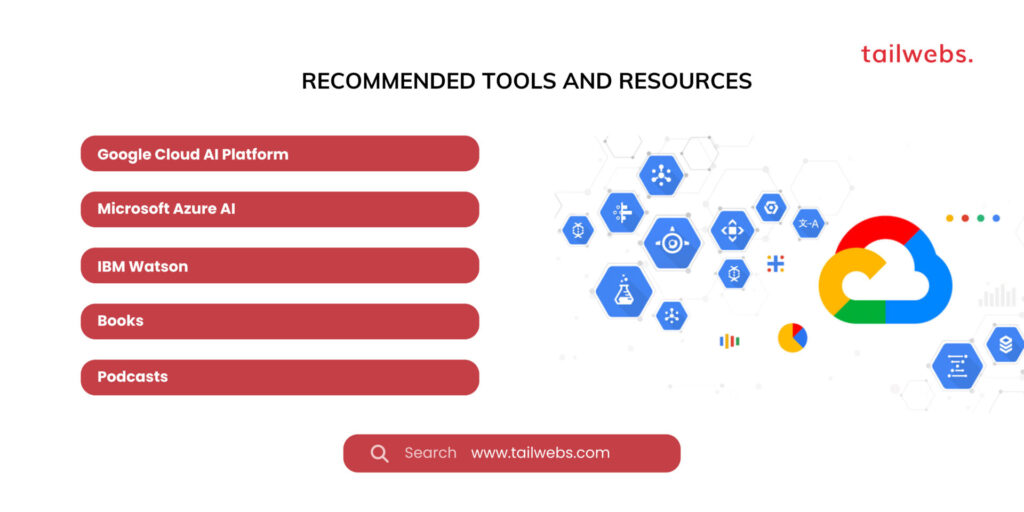
Conclusion:
The era of AI in business is not just here, it’s accelerating. By demystifying this technology and exploring its practical applications, you can empower your business to navigate the changing landscape and emerge as a leader in your industry. Embrace the potential of AI, invest in its implementation, and unlock a future
Beyond the Basics: Advanced AI Strategies for Enhanced Growth
Mastering the core applications of AI is a crucial first step, but truly innovative businesses push the boundaries of this technology. Here are some advanced AI strategies to take your business to the next level:
1. Hyper-Personalization:
Go beyond product recommendations and delve into predictive personalization. AI can anticipate customer needs, adjust content and offers in real-time, and create truly custom experiences that foster deeper engagement and loyalty. Imagine a website that dynamically changes its layout and offerings based on your individual preferences and past behaviour.
2. Conversational AI and Natural Language Processing (NLP):
Elevate your customer interactions with sophisticated AI chatbots and virtual assistants. NLP allows these bots to understand the nuances of human language, engage in complex conversations, and even resolve customer issues without human intervention. Think of a virtual assistant handling customer inquiries with empathy and understanding, building trust and resolving problems efficiently.
3. Edge AI and the Internet of Things (IoT):
Decentralise intelligence with edge AI, where devices process data at the source instead of relying on centralised servers. This enables real-time decision-making, faster response times, and enhanced operational efficiency. Imagine smart sensors on your production line autonomously detecting and correcting minor issues before they escalate, all powered by edge AI.
4. AI-powered Content Creation and Marketing Automation:
Leverage AI’s creative potential to generate customised content like product descriptions, social media posts, or even targeted advertisements. AI can analyse your audience data and generate content that resonates deeply with them, saving time and resources while maximising impact. Imagine AI automatically crafting personalised marketing emails that convert customers based on their specific interests and purchase history.
5. Responsible AI and Ethical Considerations:
As AI becomes more integrated into our businesses, it’s crucial to approach it responsibly. Ensure your AI practices are ethical, transparent, and unbiased, mitigating potential risks and fostering trust with customers and employees. Invest in bias detection tools, establish clear ethical guidelines, and prioritise human oversight and accountability.
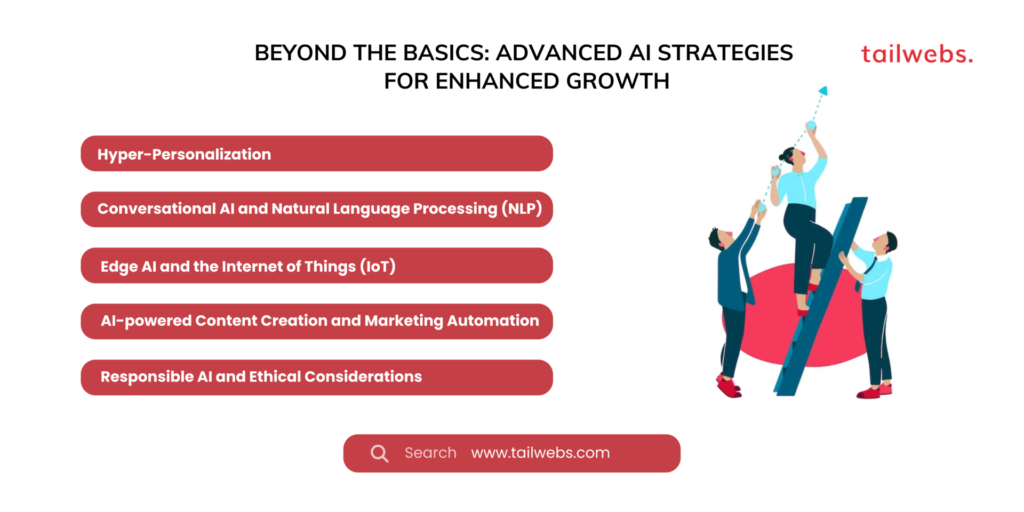
Remember:
Embrace experimentation and continuous learning. The world of AI is constantly evolving, so be prepared to adapt and test new strategies.
Focus on human-centred AI. Technology should always complement and empower human capabilities, not replace them.
Prioritise transparency and communication. Inform your employees and customers about your AI implementation and address any concerns openly.
Recommended Tools and Resources:
Google Personalization API: A tool for creating personalised user experiences.
Microsoft LUIS: A platform for building conversational AI apps.
AWS IoT Core: A service for managing IoT devices and data.
Jasper AI: An AI-powered content writing platform.
Books: “Human + Machine: Reimagining Work in the Age of Intelligence” by Paul D. Stammer, “Ethics of Artificial Intelligence” by John Danaher, “The Alignment Problem” by Brian Christian
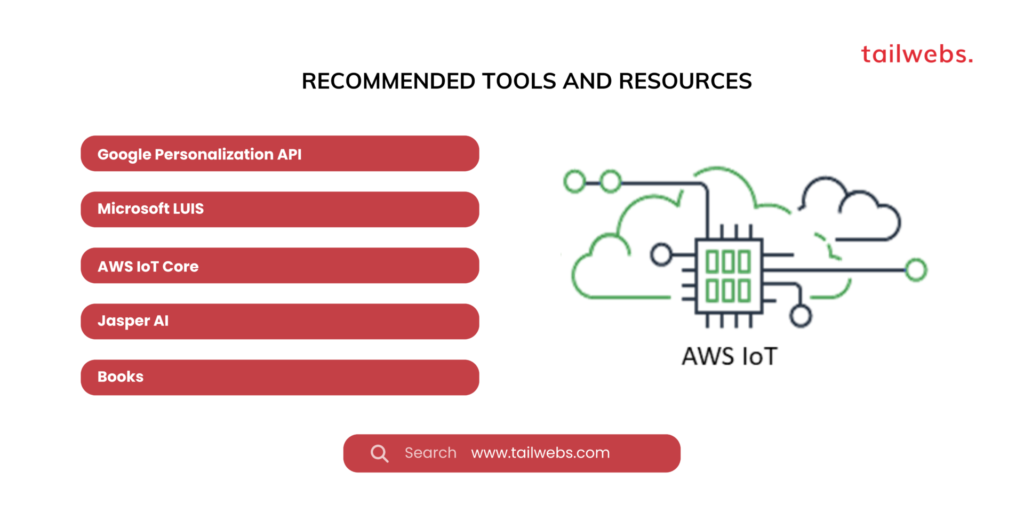
Conclusion:
By embracing advanced AI strategies and approaching this technology responsibly, you can unlock its full potential and propel your business forward. Remember, AI is not about replacing humans, but about augmenting our capabilities and creating a future where human intelligence and machine learning work together to achieve remarkable things. So, start your AI journey today, embrace the possibilities, and become a leader in the age of intelligent business.
